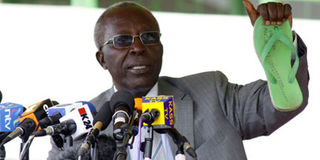Tough laws to curb cheating as exams start

Former Education Minister Sam Ongeri displays a bathroom sandal with answers to KCPE questions written on it on November 28, 2011. Schools will not be allowed to withdraw the candidature of a student from national examinations as a form of punishment, the 2014 basic education regulations propose. FILE PHOTO
What you need to know:
- MPs called for a change of guard in the exams council to “safeguard against the deteriorating image of the body managing the examination in the country, as a result of malpractices, especially leakages.”
- According to the new law, those who maliciously damage examination materials also face five years in jail or Sh5 million fine.
- The secessionist Mombasa Republican Council has said it would disrupt the exams, although President Kibaki has warned against such act.
National exams begin on Monday under tough new laws against cheating and interference.
Those who leak exams face 10 years in jail or Sh2 million fine, according to Kenya National Examinations (KNEC) Act, 2012, signed by President Kibaki on Friday.
A report of Parliament’s Education committee tabled recently recommends an overhaul of the “management” of the examination council.
MPs called for a change of guard in the exams council to “safeguard against the deteriorating image of the body managing the examination in the country, as a result of malpractices, especially leakages.”
About 3,000 candidates had their Kenya Certificate of Secondary Education exams cancelled last year.
According to the new law, those who maliciously damage examination materials also face five years in jail or Sh5 million fine. (READ: Tough penalties for exam cheats)
The secessionist Mombasa Republican Council has said it would disrupt the exams, although President Kibaki has warned against such act.
Those seeking to disrupt the exams, incite others to engage in disorderly conduct or are found with offensive weapons near examination centres will be jailed for three years or fined Sh500,000.
Candidates will today start exams with orals, followed by practicals on Thursday. The theory papers begin on November 5, when candidates sit the English papers. The exams will end on November 21.
The new law also targets conmen, who sell fake examination materials. The prosecution will not be required to prove accuracy of the materials to secure a conviction.
Institutions where more than two-thirds of the candidates are found to have engaged in irregularities will be barred from being KNEC agents for a period to be decided by the council.
The Act bars officials engaged in the organisation or administration of national exams from going on strike.
It also limits the right of access to information held by the council, which the agency considers necessary to protect the examination process or an individual’s right to privacy.
Parents’ views
The Kenya National Association of Parents chairman Musau Ndunda has, however, criticised the Act, saying it does not incorporate the recommendations of a task force that last year collected views on how to reform the conduct of examinations.
“A lot of emphasis which was put on how to reform KNEC has not been incorporated.”
At the same time, Education permanent secretary, George Godia said on Sunday next year’s Form One admission lists would be announced simultaneously with the release of the Kenya Certificate of Primary Education examination results.




